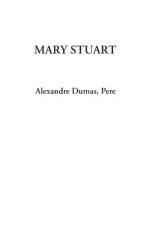Then the queen turned to them, and taking the cross from Annibal Stewart, and in her other hand her book of Hours and her handkerchief, “My children,” said she, “this is one more grief to add to our other griefs; let us bear it like Christians, and offer this fresh sacrifice to God.”
At these words sobs and cries burst forth on all sides: the unhappy servants fell on their knees, and while some rolled on the ground, tearing their hair, others kissed her hands, her knees, and the hem of her gown, begging her forgiveness for every possible fault, calling her their mother and bidding her farewell. Finding, no doubt, that this scene was lasting too long, the sheriff made a sign, and the soldiers pushed the men and women back into the room and shut the door on them; still, fast as was the door, the queen none the less heard their cries and lamentations, which seemed, in spite of the guards, as if they would accompany her to the scaffold.
At the stair-head, the queen found Andrew Melville awaiting her: he was the Master of her Household, who had been secluded from her for some time, and who was at last permitted to see her once more to say farewell. The queen, hastening her steps, approached him, and kneeling down to receive his blessing, which he gave her, weeping—
“Melville,” said she, without rising, and addressing him as “thou” for the first time, “as thou hast been an honest servant to me, be the same to my son: seek him out directly after my death, and tell him of it in every detail; tell him that I wish him well, and that I beseech God to send him His Holy Spirit.”
“Madam,” replied Melville, “this is certainly the saddest message with which a man can be charged: no matter, I shall faithfully fulfil it, I swear to you.”
“What sayest thou, Melville?” responded the queen, rising; “and what better news canst thou bear, on the contrary, than that I am delivered from all my ills? Tell him that he should rejoice, since the sufferings of Mary Stuart are at an end; tell him that I die a Catholic, constant in my religion, faithful to Scotland and France, and that I forgive those who put me to death. Tell him that I have always desired the union of England and Scotland; tell him, finally, that I have done nothing injurious to his kingdom, to his honour, or to his rights. And thus, good Melville, till we meet again in heaven.”
Then, leaning on the old man, whose face was bathed in tears, she descended the staircase, at the foot of which she found the two earls, Sir Henry Talbot, Lord Shrewsbury’s son, Amyas Paulet, Drue Drury, Robert Beale, and many gentlemen of the neighbourhood: the queen, advancing towards them without pride, but without humility, complained that her servants had been refused permission to follow her, and asked that it should be granted. The lords conferred together; and a moment after the Earl of Kent inquired which ones she desired to have, saying she might be allowed




